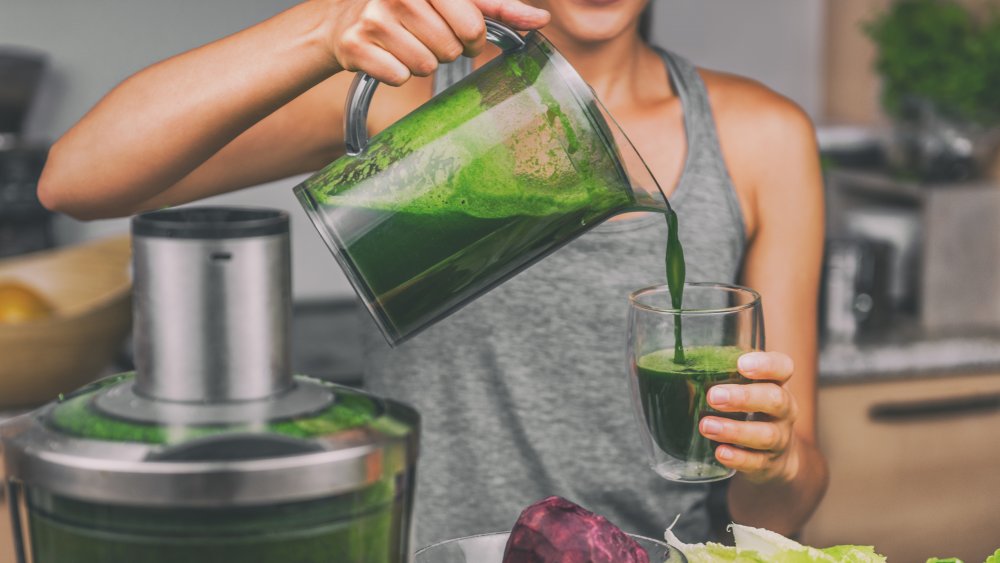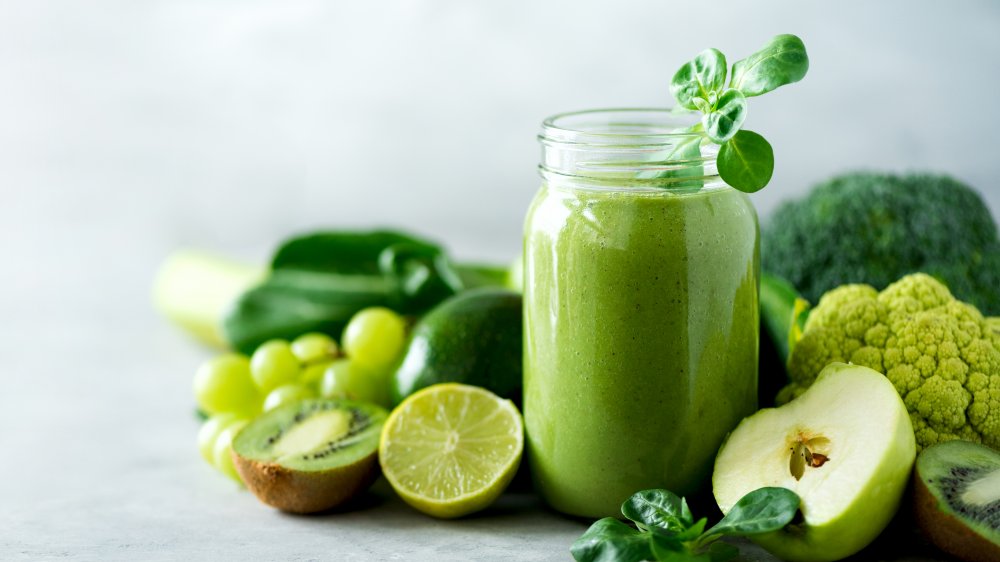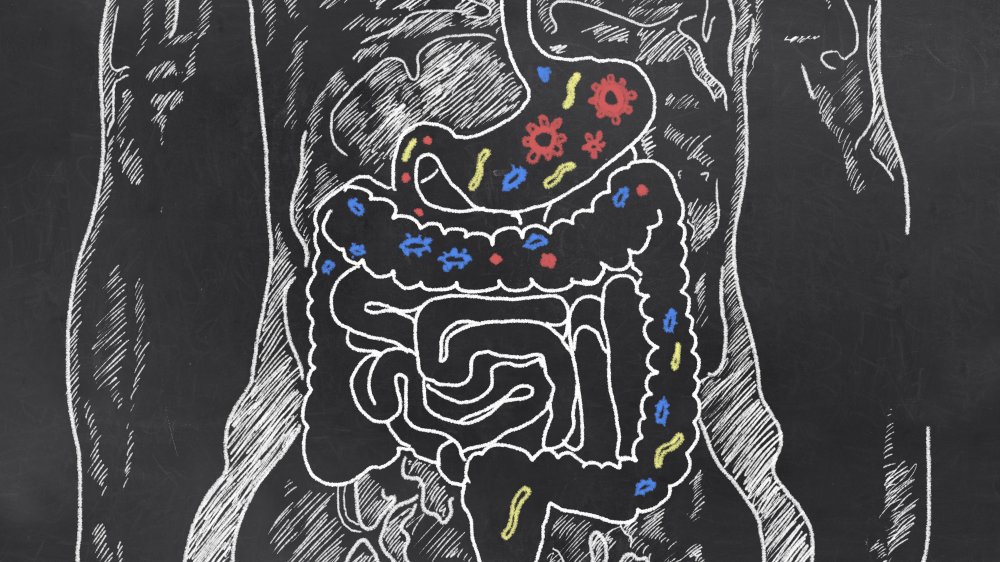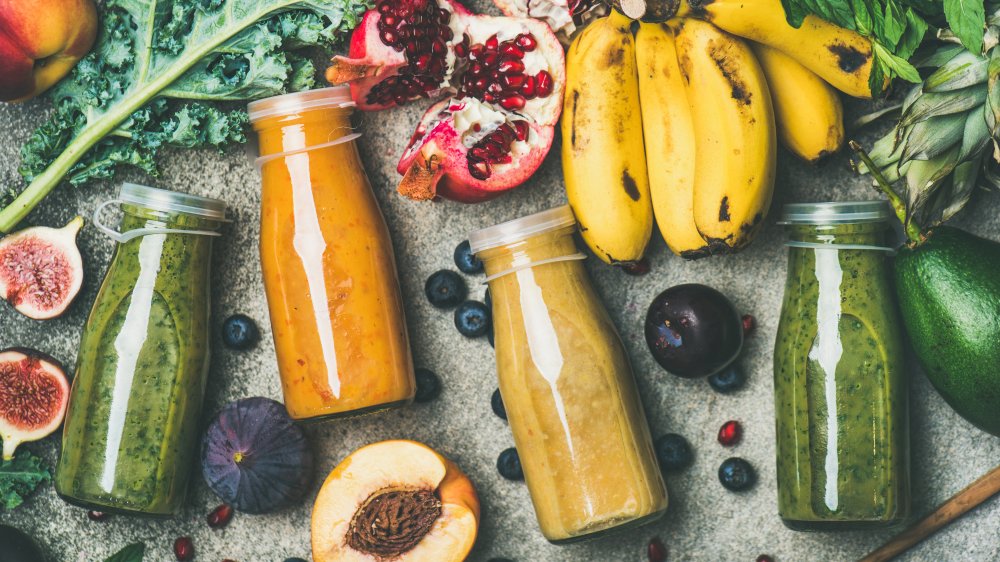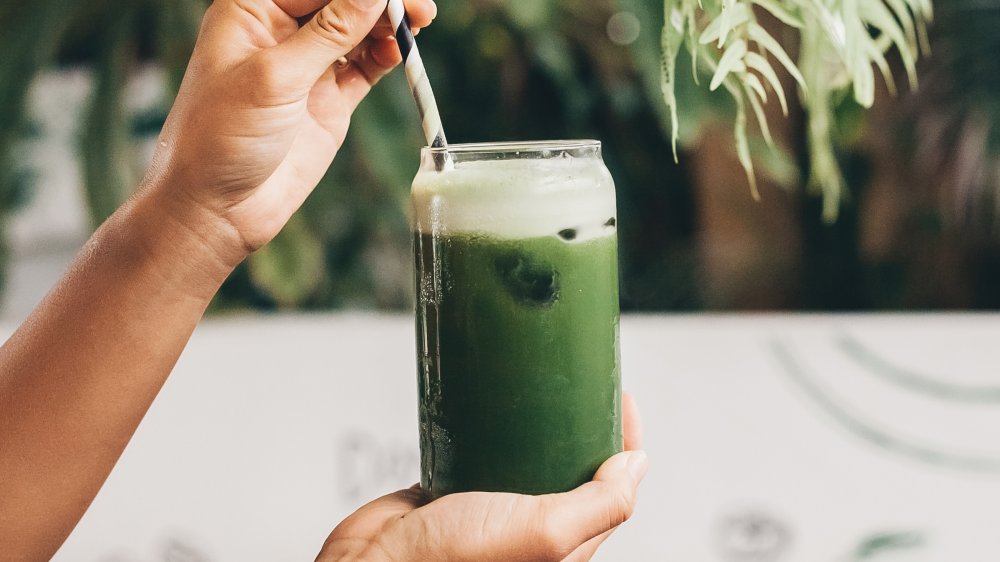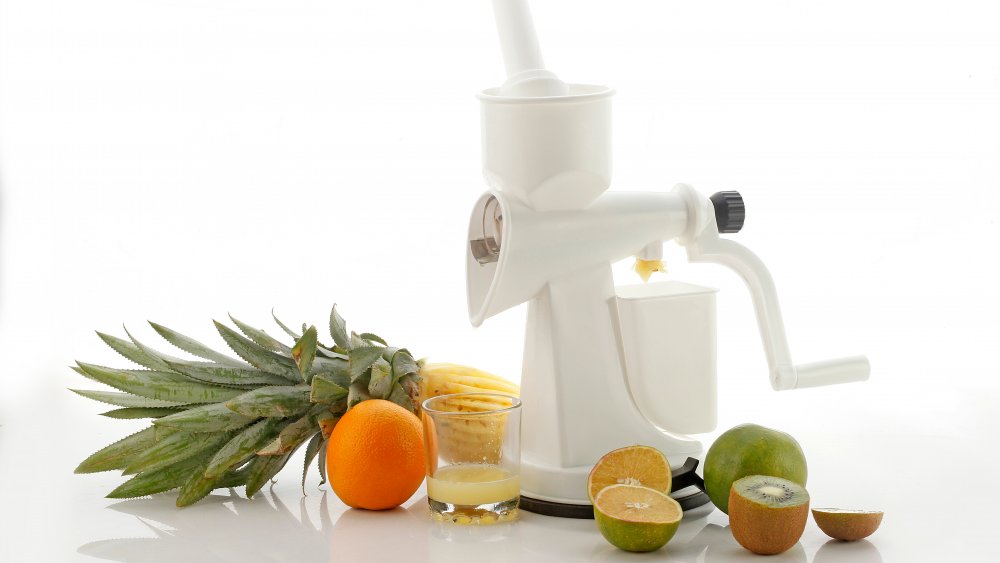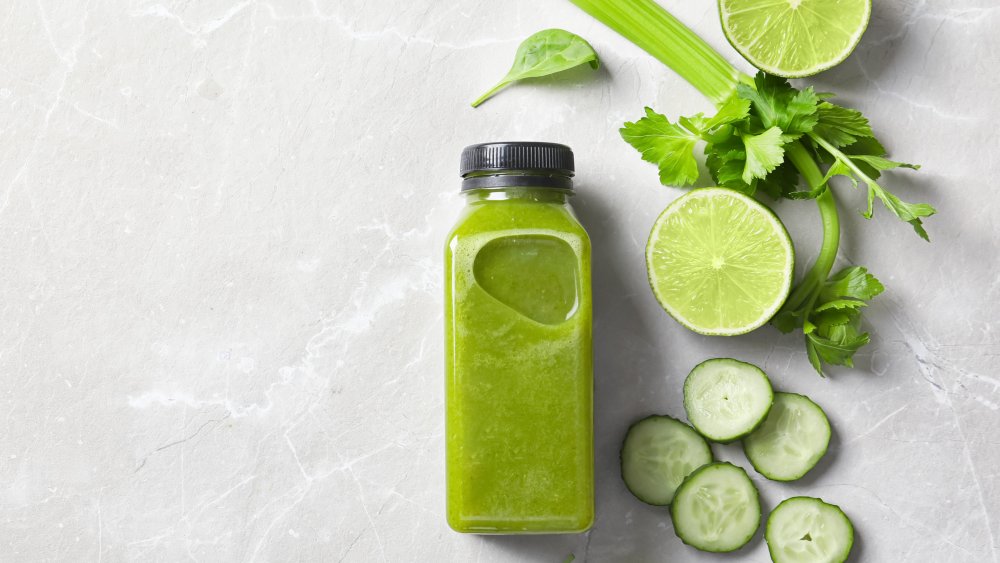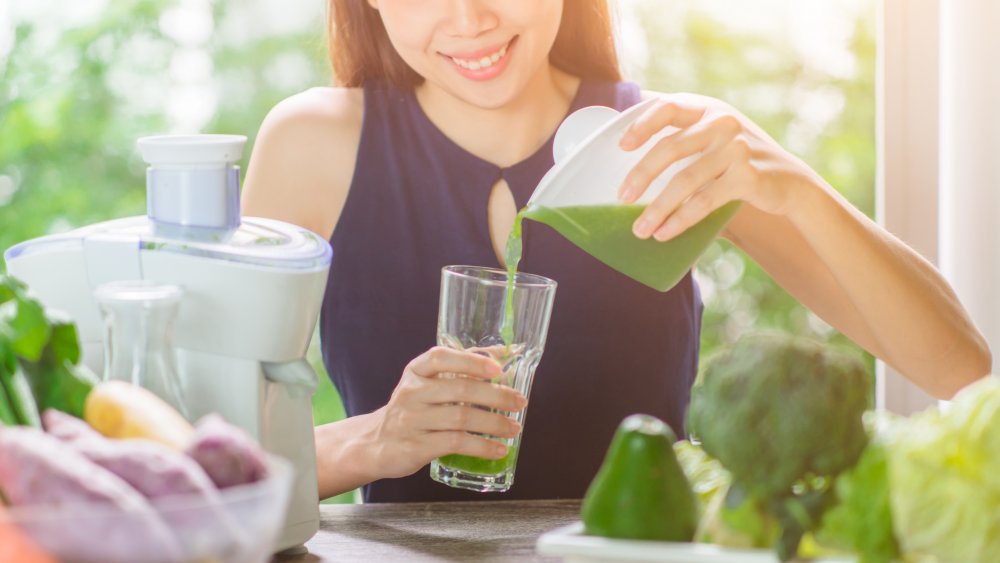When You Drink Green Juice Every Day, This Is What Happens To Your Body
Green juice may not look super appetizing, but it's become increasingly popular. According to Shape, green juice has graduated from niche health food to national obsession, enjoyed daily by the likes of Meghan Markle and Julianne Hough. The beauty of green juice is that you can include a wide variety of vegetables and fruits, adding whichever ingredients offer the nutrients or taste you're looking for. According to Healthline, common veggie ingredients include kale, spinach, Swiss chard, celery, wheatgrass, and cucumber, while berries, citrus fruits, apples, and kiwis are all popular fruit options that offer their own nutrients and a bit of sweetness. You can also add herbs like parsley or mint for a boost in both flavor and nutrition.
According to a survey of over 2,200 Americans conducted by YouGov and reported on in Men's Journal, the majority of respondents believed that green juice is a healthy beverage choice and an excellent way to consume more fruits and vegetables. In fact, more than 20 percent of those surveyed said they'd rather get veggies like beets and dark leafy greens in juice form. But if you drink green juice every day, how will it affect your body? And how does it compare to simply eating whole fruits and vegetables?
If you drink green juice every day, it's an easy way to get your body the vegetables and fruits it needs
The U.S. Department of Agriculture (USDA) recommends that adult women between the ages of 19 and 50 eat 2.5 cups of vegetables a day, while adult men in the same age range should eat 3 cups. When it comes to fruit, the USDA recommends women age 19 to 30 eat 2 cups daily, while women 31 and older need only 1.5 cups. Adult men of all ages should aim for 2 cups of fruit a day.
While that may not sound like a lot, most Americans don't meet these recommendations. According to research conducted by the Centers for Disease Control and Prevention (CDC) and reported in Time, only 12.2 percent of American adults eat the daily recommended amount of fruit, and a measly 9.3 percent eat the recommended amount of vegetables.
If you drink green juice every day, it may make it much easier to up your intake of vegetables and fruits. As nutritionist Lisa Richards told The List, "A benefit to juicing over eating whole vegetables is convenience. Most individuals would not eat the amount of vegetables in one sitting as they would in their green juice."
If you're worried about regularity, you probably don't want to only drink green juice every day
While choosing to drink green juice every day may help you consume your veggies and fruit more conveniently than if you ate them, the juicing process leaves out one important part of these foods: the fiber. As registered dietitian Trista Best explained, "Having to discard the bulk of the solid, fibrous portions of fruit and vegetables for juicing means you are throwing out fiber. Fiber is primarily found in these portions that are not being consumed when you opt to [drink] juice."
According to the Mayo Clinic, adult women should aim to get 21 to 25 grams of fiber a day, depending on age, while men should shoot for 30 to 38 grams. Fiber provides many benefits, including helping to regulate bowel movements, improving digestive health, lowering cholesterol, and preventing blood sugar spikes.
If you aren't getting enough fiber elsewhere in your diet and your trips to the bathroom are less than optimal, you may want to consider swapping out your juicer for a blender. As Best pointed out, unlike juicing, blending retains all parts of the fruits and vegetables used, including the fiber-containing skin and pulp. So a green smoothie may be a better choice than a green juice.
You may feel hungry soon after you drink green juice
According to the Cooper Institute, how full you feel after eating something depends on the macronutrient content of that meal. While food that takes up a lot of space in your stomach may trigger signals to stop eating, protein and fiber have the biggest role to play in controlling when you'll be hungry again.
Unfortunately, the fruits and vegetables that most often go into green juice contain very little protein, and juicing removes the fiber naturally found in these foods (via Healthline). The result? A very temporary sense of fullness. As neurologist Dr. Chris Norris at Sleep Standards explained, "Green juices will give you a really short feeling of satisfaction because they are so high in water content and so low in calories ... Chances are that you will feel hungry again after just 1 hour of even 30 minutes." He cautioned that green juices should not be used as a meal replacement because they don't provide enough calories to fuel your body and the lack of protein, fiber, and fat means you're likely to experience cravings for more substantial food soon after. So, if you want to drink green juice every day, don't use it as a total meal replacement.
When you drink green juice every day, your body may absorb micronutrients more easily
The lack of fiber in green juice does, however, have two major benefits: It increases the concentration of micronutrients and it also makes them easier to absorb.
Mark Wendle, a registered dietitian at Fitness Savvy, explained that, by removing fiber, juicing results in more micronutrients ounce for ounce when compared to blending or eating whole fruits and veggies. You'd have to eat a much larger quantity of whole or blended vegetables and fruits to get the same amount of micronutrients in a single glass of green juice.
And, according to health and wellness researcher and coach at Tons of Goodness Kathryn Schwab, a lack of fiber also means faster and easier absorption of nutrients. She told The List, "The vitamins in fruits and vegetables, such as vitamin C and vitamin A, are absorbed better in liquid form. Your body can bypass unnecessary digestion of fiber and then more quickly and efficiently absorb nutrients."
The Mayo Clinic points out that fiber, although important for overall gut health, requires some effort to digest, so when you drink green juice, it may be a way to give your digestive system a brief rest.
If you drink green juice every day, it may have an impact on your gut microbiome
In addition to providing easily absorbed nutrients by following through on your decision to drink green juice every day, your regular intake of the beverage may affect your gut microbiome. According to Healthline, the gut microbiome is a collection of trillions of microorganisms — mostly bacteria — that reside throughout your digestive tract and are most concentrated in a part of your large intestines called the cecum. This microbiome is made up of hundreds of species of microorganisms and which species are present depend, in large part, on your diet. The microbiome serves many beneficial functions, including helping to digest certain nutrients, producing vitamin K and certain B vitamins, and protecting us against other microorganisms that can cause disease.
In a study published in Scientific Reports in 2017, a research team led by Dr. Susanne M. Henning investigated how a three-day diet of vegetable and fruit juices changed the microbiomes of participants. They found that Firmicutes and Proteobacteria bacteria significantly decreased, while Bacteroidetes and Cyanobacteria increased. The researchers pointed out that the bacteria that had increased in number were those most associated with weight loss.
You could boost your immune system if you drink green juice every day
If you're feeling a bit under the weather, you may want to start to drink green juice every day, as it is a great way to give your immune system a boost. Nutritionist Lisa Richards told The List, "Another benefit of increased vitamin intake through green juice is improved immune function. This is especially true in regard to antioxidants and phytonutrients. These plant compounds are easily and quickly consumed through green drinks and work in the body to mitigate free radical damage." She pointed out that this free radical damage can overtax and weaken the immune system.
It shouldn't come as a surprise that what you eat can impact your immune system, since about 70 percent of your immune system is actually located in your gut. But not all green juice ingredients offer the same benefits, and certain combinations may work together better than others. According to Healthline, kale, celery, lettuce, beets, and carrots are all great vegetables to include, while green apple, citrus fruits, and strawberries can offer additional benefits and make the drink a bit more palatable.
If you drink green juice every day, will it help you detoxify your body?
Green juices are often marketed as a way to "cleanse" the body, but, according to registered dietitian Keri Glassman, they aren't a miracle product. In an interview with Shape, she explained, "A multiple-day, juice-only detox diet doesn't seem necessary for our bodies, which naturally detox through the liver, kidney, and GI tract. ... I wouldn't recommend a cleanse in place of a normal diet."
While green juice won't instantly flush all the "toxins" out of your body, it can include nutrients that support your body as it undertakes its own natural detoxification process. Dr. Chris Norris, a psychiatrist and neurologist, at Sleep Standards told The List that green juice can promote liver health. "For example, studies have found that cruciferous vegetables [including common green juice ingredients kale, spinach, and watercress] can improve phase II detoxification in the liver," he said. "This means your liver will be more efficient at quickly getting toxins out of your body."
The Cincinnati Health Institute outlines a three-phase process by which the body clears out toxins. Each phase has a different function and requires different enzymes and nutrients to be successful.
Some green juices are high in sugar, which could put you at greater risk for diabetes
Just because it's green doesn't mean your juice is necessarily low in sugar. As nutritionist Lisa Richards explained, "Green juice that utilizes a lot of fruits and just one or two green vegetables will have a high sugar concentration. This means green juice can cause unstable blood sugar and spikes [in blood sugar]." She added that there's nothing to slow the absorption of these sugars because juices contain little if any fiber. In addition to sugars from fruit ingredients, Healthline noted that commercially bottled green juices may also contain added sugar.
Medical News Today pointed out that consuming excess amounts of sugar may not directly cause type 2 diabetes, but it has been strongly linked as a risk factor. This is because it can cause increases in weight and fatty deposits in the liver and lower insulin sensitivity.
When making your own green juice, psychiatrist and neurologist Dr. Chris Norris at Sleep Standards recommends a ratio of at least three veggies for every fruit as a way to ensure the drink's sugar levels are kept in check. So, if you want to drink green juice every day, just keep your sugar levels in mind.
If you drink green juice every day, you could keep yourself looking young
Worried about aging? You're not the only one. In 2017, the New York Post reported that 28 percent of women under 25, 42 percent of women aged 25 to 34, and 54 percent of women between the ages of 35 and 44 worried regularly about their appearance as they age, according to a study done by Dermstore. Luckily, green juice might just be the beauty elixir you've been searching for, which is a pretty convincing reason to drink green juice every day.
Psychiatrist Dr. Chris Norris at Sleep Standards chalks up green juice's youth-promoting powers to its hydrating nature and rich antioxidant content. He told The List, "The extra hydration ... makes it especially good for your skin, keeping it clear and giving you that extra-dewy, healthy glow. Greens also contain vitamin C, vitamin E, and manganese, which are antioxidants that ... protect your body from oxidative damage, which contributes to physical aging."
If you're curious which vegetables and fruits to throw in your green juice for the youngest-looking skin, the Mayo Clinic suggested tomatoes, berries, carrots and other yellow and orange fruits and vegetables, and dark leafy greens like spinach.
A glass of green juice a day may keep the cardiologist away
If you want to keep your ticker in tip-top shape, you may want to drink green juice every day. In 2017, a team led by Dr. Jie Zheng published a paper in the International Journal of Molecular Sciences that reviewed numerous studies on the cardiovascular benefits of drinking vegetable and fruit juices. The researchers concluded that these juices offered several heart-healthy benefits, including lowering blood pressure. They attributed these benefits to a number of factors, including the juices' antioxidant and anti-inflammatory properties and their ability to prevent platelets from clumping together, which could lead to blood clots. The researchers also recommended that individuals drink a mixture of different juices "because they contain a variety of polyphenols, vitamins, and minerals from different fruits and vegetables." Your multi-ingredient green juice fits that recommendation perfectly.
Heart disease, which is actually an umbrella term for a number of conditions, including coronary artery disease, heart attack, and congestive heart failure, is the No. 1 cause of death in the United States, according to the Centers for Disease Control and Prevention (CDC). So, drinking green juice may be one of the ways to make your heart healthier.
Can the chlorophyll in green juice give your blood a boost?
According to Medical News Today, chlorophyll (the pigment that gives plants their green color) is chemically very similar to hemoglobin (the protein that allows red blood cells to carry oxygen throughout the body). Because of this similarity, some researchers believe consuming chlorophyll may help with the treatment of anemia and other conditions caused by hemoglobin deficiency.
For example, a pilot study conducted by Dr. Manju Chauhan and published in the International Journal of Chemical Studies in 2014 concluded that wheatgrass juice, which is about 70 percent chlorophyll and is an ingredient often added to green juices, may be useful in combating certain chronic blood disorders.
Unfortunately, as Healthline pointed out, the chlorophyll from vegetables may be destroyed by the strong acids in the stomach and not make it to the intestines, where it could be absorbed. For that reason, those who want to reap the potential benefits of chlorophyll might want to consider swapping their green juice for a chlorophyll supplement encased in a protective coating that will let it pass through the stomach unscathed.
If you're worried about kidney stones, you may not want to drink green juice every day
Although green juice may boast a high concentration of micronutrients, the juicing process also results in a high concentration of the anti-nutrients found in vegetables. As nutritionist Lisa Richards explained to The List, "The primary anti-nutrient in green juice is oxalic acid, which is present at much higher rates than in normal meals. A high concentration of oxalic acid can cause kidney damage."
According to the National Kidney Foundation, oxalic acid (also known as oxalate) binds to calcium in the digestive tract, creating calcium oxalate fragments. While they usually leave the body through stool and urine, in some individuals, they collect in the kidneys and become painful kidney stones.
Even more alarming, a paper published in 2018 in the American Journal of Kidney Diseases discussed the case of a woman who suffered acute end-stage kidney failure after consuming excessive amounts of oxalate while following a green juice cleanse. Although the woman had normal kidney function before beginning the cleanse, it's important to note that she had several predisposing factors for kidney failure, including having had a gastric bypass surgery and long-term antibiotic use.
So, if you want to drink green juice every day, be sure to consider your medical history and speak with your doctor.
If your green juice has been pasteurized, your body may not be getting as many nutrients as you think
Not all green juices are created equal, and whether or not a juice has been pasteurized may make a big difference when it comes to its health benefits. While milk may be the first thing that comes to mind when you hear the word pasteurization, many foods, including juices, may undergo this brief heating process. According to Healthline, many commercially bottled green juices are pasteurized in order to both kill potentially harmful bacteria and extend the juices' shelf life.
In an interview with Shape magazine, registered dietitian Keri Glassman explained, "There's a major distinction between pasteurized juice — like the OJ you'd find at the grocery store — and cold-pressed juice from your local juice bar or shipped fresh to your door." She noted that the high temperatures used in pasteurization can destroy "live enzymes, minerals, and other beneficial nutrients."
Glassman recommended choosing cold-pressed green juices instead. She explained that because cold-pressed juices have not been damaged by heat, they contain three to five times the nutrient content of pasteurized juices.
If you want the most health benefits when you drink green juice every day, always choose the freshest option
It's important to know that green juice has a short shelf life. Neurologist and psychiatrist Dr. Chris Norris at Sleep Standards told The List, "The lack of fiber [in green juice] speeds up the oxidation process, which means that the juice loses its nutrients very quickly." He recommended individuals drink the freshest possible green juice but admitted that it may be hard to always find time for a daily juicing. Kathryn Schwab, a health and wellness researcher and coach at Tons of Goodness, noted that homemade green juice made with a centrifugal juicer will stay fresh for only 24 hours.
If you don't have the time or energy to make your own green juice every day, it's important to know that pre-bottled green juices often contain preservatives. According to the Food and Agriculture Organization (FAO), common preservatives used in fruit and vegetable juices include sodium benzoate, potassium sorbate, and sulfur dioxide. Some of these preservatives are controversial. For example, some individuals worry that sodium benzoate may cause cancer.
